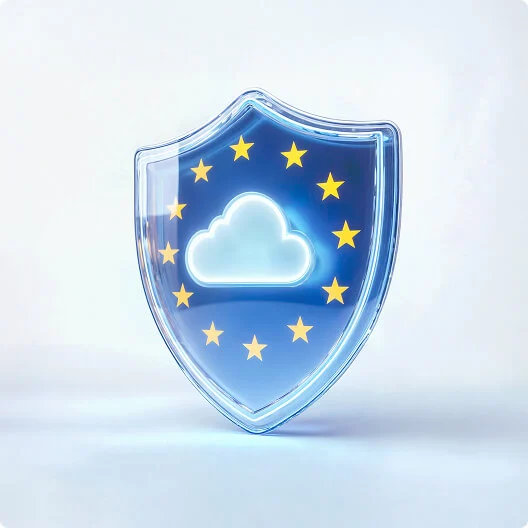SECA, for an independent digital Europe
Aruba, IONOS and Dynamo introduce Sovereign European Cloud API (SECA)
An open industry standard, a new Application Programming Interface specification for Cloud Infrastructure Management, paving the way for the EuroStack.
SECA is first and foremost all about
A great and inclusive collaboration of real European CSPs for sovereign multi-cloud, open to all European cloud providers.
A best in-class initiative fostering multi-cloud interoperability and close collaboration, while maintaining full control of data.
A clear-cut, robust, resilient, well-documented API, following OpenAPI standards.
The best way to ensure effortless deployment, faster cloud provider comparison and easier testing.
A tangible and essential building block for the EuroStack, securing independence, sovereignty and interoperability in a cost-efficient manner.
The best safeguard against vendor lock-in, ensuring sustained economic strength, limitless scalability and freedom from licence entanglements.
The fastest way to adopt new cloud providers, and the most comprehensive learning solution, future-proof and independent of third-party tools.
The most undiluted, accessible, free-of-operational costs way to deploy and run workloads and applications seamlessly across clouds.
Why SECA
The first, working, production-ready API specification
SECA API - the Sovereign European Cloud API - is the first, working, production-ready API specification, that combines the power of the great European cloud provider landscape by enabling users to deploy workloads in a multitude of public Infrastructure-as-a-Service environments, based on open standards, without having to lose sovereignty nor having to rely on trustees. All for a strong, successful, self-confident European economy.The first truly sovereign API in the cloud sector
Now, in a pioneering effort to advance cloud services across Europe, Aruba, IONOS and Dynamo announce the SECA Application Programming Interface (API) specification, the first sovereign API in the field of Cloud Infrastructure Management Services. The API is set to be working and productive, building a Level Playing Field for successful and growing European cloud providers.Background
In an interview with the BBC a couple of years ago, Sir Richard Moore, Chief of MI6, once described the dangers of digital dependencies. The head of foreign intelligence spoke of a literal ‘trap for data’ and coined it as such: ‘If you allow another country to get access to really critical data about your society, over time that will erode your sovereignty because you no longer have control over that data.’
For European countries, this data trap might get locked if the plans of national public administrational bodies and private corporations to migrate to U.S. hyperscale clouds move forward unhindered. This relocation of public infrastructure and data to the cloud of a U.S. company means that the data is not only subject to domestic legislation, but also to U.S. legislation, even if hosted physically on European soil.
This is due to the U.S. Cloud Act and supporting legislation such as the reauthorised FISA section 702 or sanctions according to IEEPA in the U.S. The new Presidency will be literally empowered to unilaterally affect handling of European data. U.S. Executive authorities are in a position to legitimately access data held in data centres of U.S. service providers outside the USA. These service providers are even legally obliged to maintain confidentiality about access in a considerable number of cases.
Anyone storing data in these ‘clouds’ loses therefore exclusive control over their own data and information. They must acknowledge the high risks involved and the inability to fully shape their own future. Company secrets and personal data could easily fall into the wrong hands. This is a reality that should be crystal-clear to everyone.
Most recently, U.S. Vice President JD Vance specifically targeted the GDPR in his speech at the Paris AI Summit, criticizing the EU for over-regulation. He stated that the U.S. will not accept foreign governments imposing stricter regulations on U.S. companies. As a result, Europe will likely face increased scrutiny and tougher challenges regarding data protection issues affecting both European citizens and companies, as well as all EU-based organizations.
What is SECA
SECA API has been built and continues to evolve in line with the specifications set by the Open API Initiative, the most widely used API description language. Open API ensures trust among a vast developer community and is always open for inspection.
Thanks to committing to a firm standard, European public cloud services will be interoperable and multi-cloud configurations can be created at ease on each public cloud. Functions of the API will be extended continuously. Contributing providers have their say.
A standardized API, connected to European sovereign clouds, acts as a powerful magnet for third-party entities, as well as the API and application developer community, encouraging the development of software that natively aligns with this standardized API.
Accelerated development and deployment drive greater innovation, faster time-to-market, risk diversification, and enhanced resilience in an agile development environment. Enables scalability at any size, all while being free of operational or licensing costs.
High market concentration and limited interoperability pose significant challenges for the European economy. SECA is the opposite of vendor lock-in, fringed by low migration costs and enhanced response speed to market changes, ending out in a seamless provider switching, allowing for faster cloud provider comparison and easier testing.
Uncomplicated access to a unified pool of virtual infrastructure/platform resources, a low entry barrier for new participating cloud providers, without effort in training and learning, or expensive provider-related certifications, provide the level of interoperability, reversibility, and control required. SECA, a powerful magnet for software developers to connect applications to.
SECA starts with IaaS Cloud infrastructure, but future releases will expand into the PaaS services you need most! SECA is set to deliver PaaS as a next step. SECA encourages open participation, to jointly identify the gaps that must be addressed to achieve a position of leadership in the sovereign cloud space.
Cloud is at the heart of digitization. European cloud providers of all sizes are making interoperability a reality for every user, developing a common API standard, and ensuring alignment with EU regulatory requirements. SECA represents a critical foundational element for the upcoming EuroStack.
Sovereignty has principles!
Customers may just tap into offerings truly adhering to the following principles:
European sovereignty
To define a set of rules applied to all published services, and automating their verification to reduce the burden of compliance from providers, and increase user trust for a flourishing European data economy, WHICH WILL HAVE A FIRM ROOTING IN EUROPE.European infrastructures
To recognize the importance of creating a common infrastructure space, joining existing physical assets in a true commercial federation, creating a critical mass of resources and territory reach that no single provider can achieve.European alternative
To create a concrete market vehicle for the European relaunch and competition in the digital economy, in line with the European principles and safeguarding the interests of European providers and users.European brand
To unify the voices of European participants into a single cohesive force, ensuring aligned interests and creating strong visibility for a unified European brand.Sovereignty Rationale
However, there are still choices to be made. Europe already has a thriving Public Cloud landscape. While the European cloud market is now over six times larger than it was in early 2017, and European service providers have significantly grown their cloud revenues, even achieving 'Major Player' status in vendor ratings, their relative market share has nonetheless continued to decline.
This is because major customers, corporations, and public sector bodies have shifted their huge workloads into the availability zones of American hyperscalers often for reasons of commodity, a portfolio of free services including training, a considerable effort on their side into political affairs initiatives, while disregarding required compliance, specific needs and innovation, creating imminent lock-in issues and loss of data control for the end-user with an ever-growing high market concentration.
Therefore, growth rates of most European service providers are still lagging behind the overall cloud market growth of hyperscalers with the major three global cloud providers, namely AWS, Microsoft and Google, now accounting for 75 to 80 percent of the European market.
High market concentration and lack of interoperability bring a series of challenges to Europe and risks to the end-user.
Become part of SECA
SECA is open to all genuinely European cloud service providers. API certification offers complete assurance of true sovereignty.
To guarantee the integrity of the SECA API, a rigorous certification process will be implemented. This process will verify that the open API adheres to transparent industry standards, best practices, and security protocols.
The certification will cover several critical aspects, including legal immunity from third-party country interference or executive orders, independence of software supply chains from external legal jurisdictions, and a firm commitment to upholding API specification standards.
Become part of SECA and contribute to shaping Europe's cloud sovereignty.


By completing this certification process, the SECA API will be ensured to be unbiased, secure, efficient, and reliable for its intended use. This will add value for various stakeholders, including software developers, end users, managed service providers, and IT integrators, who will benefit from the implementation of security protocols and the assurance of continuous data availability and operational resilience under familiar EU jurisdiction.
Furthermore, common certification rules will be aligned with European rules to preserve the core of European sovereignty. This will ensure that the SECA API is developed and implemented in a way that respects and upholds European values and principles.
Welcome to all truly Europe-based cloud service providers!
Looking forward to receiving your suggestions and growing this project.
Benefits for cloud customers
The newly developed SECA (Sovereign European Cloud API), provides tangible benefits to users!

- Standardised interface to easily deploy workloads and applications
- Truly sovereign public clouds to implement multi-cloud without loss of authority
- Back-up deployments with many providers for enhanced resilience
- Lift & shift workloads and applications with little modification and adjustment
- A common foundation as THE Infrastructure-as-a-Service layer to build on
- Member of a connected European digital landscape, with sound competition and consequently inexpensive prices
- The best preparation for the upcoming European Data Act and federated data spaces
About SECA project
In a pioneering effort to advance cloud services across Europe, Aruba, IONOS Group and Dynamo are proud to announce the project about a new Application Programming Interface (API) in the field of Cloud Infrastructure and Platform Management Services.
This collaboration aims to foster data interoperability among cloud services by enabling cloud users to deploy and run workloads and applications in the cloud environment they want, empowering businesses to leverage integrated solutions for enhanced efficiency and innovation playing according to the European compliance of the European landscape specification, the first sovereign API in the field of Cloud Infrastructure Management Services, set to be working and productive.
